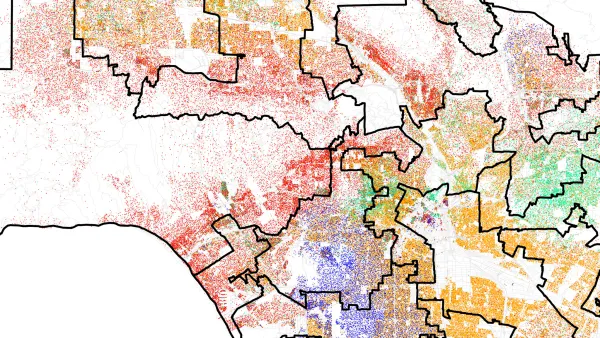A new study by PolicyLink and the University of Southern California's Program for Environmental and Regional Equity showed that U.S. GDP would expand by $2.1 trillion if racial minorities had equal access to opportunities within the job market.
Janie Boschma of the National Journal discusses the findings of a new report, "The Equity Solution," co-authored by PolicyLink and the University of Southern California. The report examines 150 major metropolitan areas within 50 states, each potentially gaining millions in additional annual revenue if residents of color were on equal footing as white residents in terms of average wages. The report also discusses each metropolitan area’s "root cause of racial inequality—how much of the income gap is attributable to a disparity in wages and how much to unemployment and underemployment.
For example, inequality in Santa Barbara, Calif., is mostly driven by a disparity in wages and could be addressed by raising wages or introducing more better-paying jobs. On the other side of the spectrum is Flint, Mich., where inequality is entirely caused by disparities in employment."
To alleviate these often expensive and deep-rooted social issues, the report’s authors "recommend several lower-cost legislative solutions, such as removing questions about criminal history on job applications, as well as enacting comprehensive immigration reform. But they acknowledge that more costly, high-return investments in public education and job training, as well as enforcement of civil-rights laws, would be necessary in order to make real progress in closing the racial income gap."
To inform individuals on data within their city and state, PolicyLink has also released their online visualization tool, the National Equity Atlas. In addition to providing average citizens knowledge on racial inequality in their home, PolicyLink hopes it will inspire action from government and community leaders.
FULL STORY: Eliminating Racial Income Gaps Would Boost GDP By $2.1 Trillion

Analysis: Cybertruck Fatality Rate Far Exceeds That of Ford Pinto
The Tesla Cybertruck was recalled seven times last year.

National Parks Layoffs Will Cause Communities to Lose Billions
Thousands of essential park workers were laid off this week, just before the busy spring break season.

Retro-silient?: America’s First “Eco-burb,” The Woodlands Turns 50
A master-planned community north of Houston offers lessons on green infrastructure and resilient design, but falls short of its founder’s lofty affordability and walkability goals.

Test News Post 1
This is a summary

Analysis: Cybertruck Fatality Rate Far Exceeds That of Ford Pinto
The Tesla Cybertruck was recalled seven times last year.

Test News Headline 46
Test for the image on the front page.
Urban Design for Planners 1: Software Tools
This six-course series explores essential urban design concepts using open source software and equips planners with the tools they need to participate fully in the urban design process.
Planning for Universal Design
Learn the tools for implementing Universal Design in planning regulations.
EMC Planning Group, Inc.
Planetizen
Planetizen
Mpact (formerly Rail~Volution)
Great Falls Development Authority, Inc.
HUDs Office of Policy Development and Research
NYU Wagner Graduate School of Public Service



























